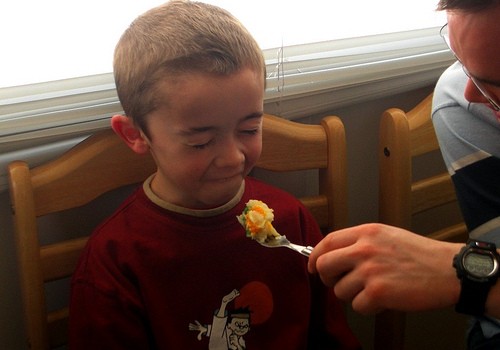
Why Are Some Kids So Picky?
For most parents, it's not always easy to understand why their kid makes a fuss when it comes to choosing what foods to eat. The truth is, being picky is a habit that kids develop overtime, as a result of what parents allow or don't. With that said, the most common reason why children become picky eaters is because of their parent's inability to say no. Sometimes, it might be easier for parents to give in their kids demands (a chocolate smoothie every afternoon or a French toast every morning) because they simply want to make them happy. In addition to that, children tend to grow into their parents' habits of consuming what is more convenient. For instance, pre-made meals (such as prepackaged noodles, chicken nuggets, etc.) are easier and faster to make than most healthy meals. Henceforth, busy parents would opt for that more often; and eventually the kid will develop a certain preference for those types of meals.
- Important notification about information and brand names used in this slideshow!
- Photo courtesy of Howard Dickins by Flickr : www.flickr.com/photos/dorkomatic/16296670/
- http://www.rxlist.com/feeding_a_picky_eater_slideshow_pictures/article.htm http://www.kevinmd.com/blog/2013/02/10-reasons-kids-picky-eaters.html

If Your Kid Eats Only One Type Of Foods
Some kids tend to have a preference for only one type of foods, generally fast foods (burgers, pizzas and the fizzy drinks that come with it), and rarely vegetables and soups! Don't worry if this is typically observed with your kid, because most parents struggle with that problem. If your child prefers eating fast foods, there is no need to be worried about it, because most adults do too. All you need to do is to readjust his/her diet and play around with the typical ingredients that comprise those fast foods. For instance, instead of frying the meat for a hamburger, you could bake it and serve it with some steamed vegetables. Make it even more fun for your little ones by allowing them to assemble their own burgers. That way, you are better able to control what they eat, and you are guaranteed that the home-made version is definitely healthier!
- Important notification about information and brand names used in this slideshow!
- Photo courtesy of kellyhogaboom by Wikimedia Commons : commons.wikimedia.org/wiki/File:Kid_eating_veggie_burger_cc_flickr_user_kellyhogaboom.jpg
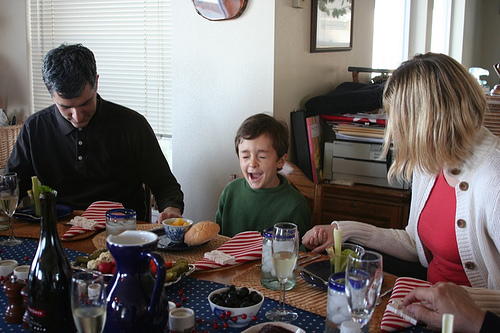
If Your Kid Doesn't Eat Veggies At All
Vegetables are considered the most important part of a healthy diet. However, they tend to be our kids biggest enemies! One of the best way to get your kid to eat all his veggies is...communication. Yes, you read right. Before trying to play any trick on your little one to get him/her to go green, it is crucial to explain to children why it is so important to eat vegetables. Children are smarter than we think, and we shouldn't underestimate their ability to understand us. In addition, make it fun for your children to eat veggies. For instance, you could serve broccoli with their favorite dip sauce. You can also cut their carrots in funny shapes, to make it easier to eat. And even at the supermarket, you can get them to choose which veggies they would love best for dinner!
- Important notification about information and brand names used in this slideshow!
- Photo courtesy of Ali Edwards by Flickr : www.flickr.com/photos/aliedwards/2056959271/
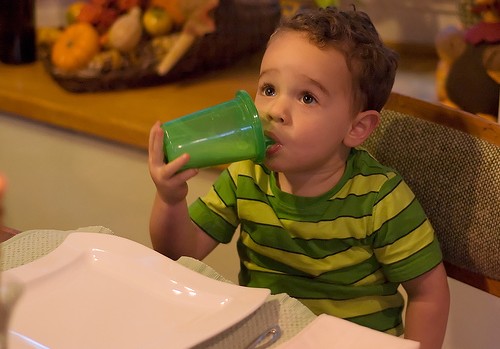
If Your Kid Just Drinks Milk And/Or Fruit Juices
Undoubtedly, milk is an essential nutrient in your kid's diet. It is rich in Calcium and Vitamin D that both work to make their bones and teeth grow strong. But when milk (and fruit juices) become the "only" thing you child can consume, you know you have a problem. First of all, too much calcium can cause health problems, and so can vitamin D excess. Furthermore, fruit juices are rich in added sugars that could raise the blood glucose to levels higher than normal, and potentially increase your child's risk of developing diabetes or being overweight. So what should you do? Well, here again it is important to find the perfect balance. Progressively cut down on your child's consumption of milk and juices by creating a new diet regimen. For instance, you could limit him/her to one glass of milk/juice per meal, to be completed with water. It might not be easy at first, but it will definitely be worth it.
- Important notification about information and brand names used in this slideshow!
- Photo courtesy of David Goehring by Flickr : www.flickr.com/photos/carbonnyc/2060372584/
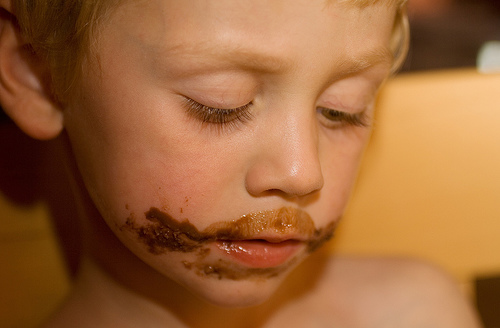
If Your Kid Seems "Addicted" To Sugar
This might seem unbelievable, but sugar addiction truly exists. It is more likely to occur in children than in adults, and this for rather obvious reasons. Because children have a tendency to like sweet things, a potential sugar addiction might not be as easy to detect as if it had occurred with an adult. Consequently, if your child constantly craves for cookies, cupcakes, candies, cakes, etc. it might not be alarming for you. However, if eating all those sweet treats impairs your child's normal diet (that is, he/she eats more sweets than food), then you know this is a red flag. Here again, correcting your child's sugar addiction is going to be challenging, but definitely worth your struggle as you will be protecting him/her from the life-changing diseases that are diabetes and hypertension.
- Important notification about information and brand names used in this slideshow!
- Photo courtesy of Dennis Brekke by Flickr : www.flickr.com/photos/dbrekke/213235922/
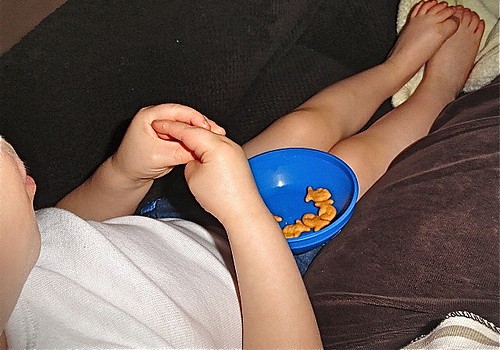
If Your Kid Eats Too Many Snacks
Before, snacks used to be considered as simple and quick foods given in between two meals (breakfast and lunch or lunch and dinner), to help your kid going and maintain his blood sugar levels. Nowadays, in some families afternoon (or midday) snacks have totally replaced meals, and this can be attributed to two factors: the snack time and the quality of the snack. if snack time is too close to lunch or dinner, the child is less likely to be hungry when comes the time to eat the "real meal". This could also happen if snacks are too heavy. One way to control this and ensure adequate nutrition for your child is by "redefining snacks". Make your snacks more healthy. In other words, opt for some fruits, a tuna sandwich or a yogurt to keep your child waiting for lunch or dinner.
- Important notification about information and brand names used in this slideshow!
- Photo courtesy of Lynn Kelley Author by Flickr : www.flickr.com/photos/lynkelwoohoo/8690406628/
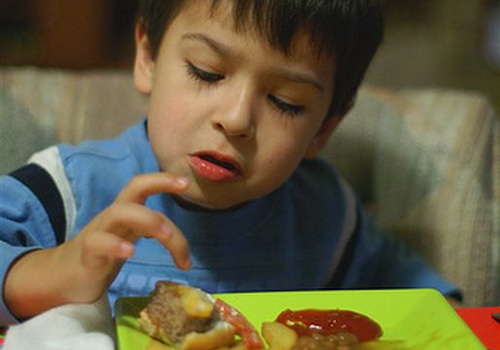
If Your Child Doesn't Eat Anything
Sometimes, it might happen that your child would not eat anything at all, and this usually has parents extremely worried. The first thing to do is to investigate and understand why your child wouldn't eat anything that you give him: maybe he had a heavy snack earlier during the day? Maybe he is sick? Or, maybe he is simply not hungry, this can happen as well. Unless your child is sick, the best thing to do in this case is to leave it alone. Respecting your child's wishes is also part of understanding him/her, and allows you to get to know him/her better.
- Important notification about information and brand names used in this slideshow!
- Photo courtesy of all in green by Flickr : www.flickr.com/photos/isoldesmom/434057363/
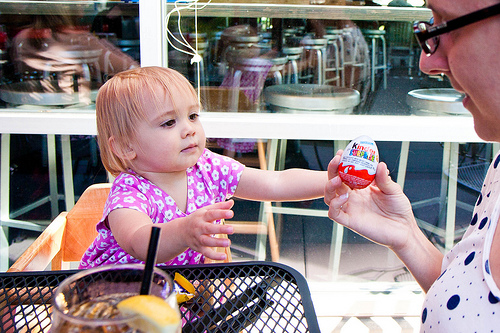
What Not To Do: Bribe Your Kid With Snacks And Sweets
Bribing your kid is a "no-no", and this at several levels! First of all, it makes you lose your authority. Your kid will end up believing that every time he resists long enough, he could end up with a reward, a sweet treat that is. Secondly, it will reinforce the importance that your child attaches to sweets and snacks. For instance, if you always present the sweet treats as a price to earn for good behavior, your child will be willing to do anything to gain it. Of course, that gets him to eat all his vegetables, but overtime he/she gets more and more attached to the snacks and sweets, which could potentially lead to a sugar addiction. And if you ever decide to withhold the sweet treat, your kid will automatically stop eating. So, don't train your children in being rewarded for eating healthy. Instead, educate them about the advantages of a healthy diet, and make them get more involved in the cooking process in order to build up their excitement about meals!
- Important notification about information and brand names used in this slideshow!
- Photo courtesy of Alan Teo by Flickr : www.flickr.com/photos/alanosaur/8898317209/

What To Do: Let Kids Help In The Kitchen
Another way to get your children to eat better and more is by allowing them to help in the kitchen. Not only will that give them a sense of achievement and self-importance, but it will also - unconsciously - get them to appreciate the things you cook, including the vegetables! You could allow them to cut up or peel the veggies (with your assistance), or simply turn the blender on. These little things would surely mean a lot more to them than you think! In addition, when they take part in the cooking process they are much more excited to taste the end product!
- Important notification about information and brand names used in this slideshow!
- Photo courtesy of Lee Stranahan by Flickr : www.flickr.com/photos/stranahan/4272992511/
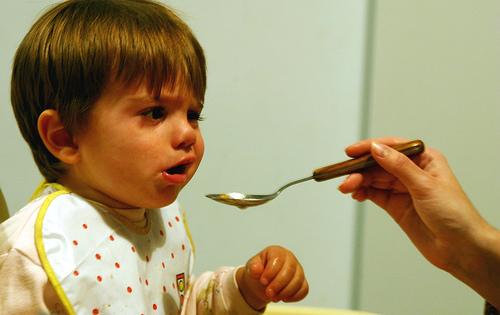
What Not To Do: Negotiate
Some parents tend to believe that negotiating with their kids on what they should eat (or not) is a good idea. In reality, it is not. Think of it this way: if you give children an option, they would always go for what they prefer, compared to what they "need"; just like adults! Sometimes as a parent, you need to be firm enough and require that your child finishes all his veggies (or his soup, or whatever else it is) before leaving the table. You don't need to be frightening, but rather, determined. And this gets you the results and saves you time.
- Important notification about information and brand names used in this slideshow!
- Photo courtesy of Leonid Mamchenkov by Flickr : www.flickr.com/photos/mamchenkov/390703177/



























Your thoughts on this
Loading...